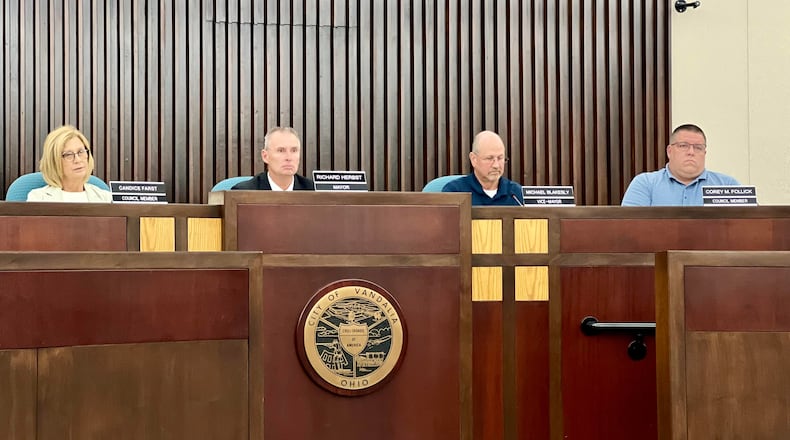“I have made sure that (document) comports with the charter, which it does, and with the chapter in the Ohio Revised Code dealing with referendums and initiatives, which it does,” McDonald said during Monday’s city council meeting.
McDonald went on to say the full requirement for the circulator’s attestation against election falsification — omission of which was the fatal flaw in this case — was not outlined in the section he referenced.
“What I did not do is look under ‘nominating petitions for state representatives,’ ” he continued. “In that section, (it says) if you circulate a petition, including a referendum petition, it has to have this language on it; I did not know that was there.”
McDonald offered the explanation in response to questions from Vandalia resident Tanya Brown, a member of the referendum petition committee which aimed to bring the council-approved South Brown School Road housing project to a public Election Day vote.
The development project involves plans to construct 167 single-family homes on 85 acres of land at 7848 S. Brown School Road.
Brown had asked whose responsibility it was to create the petition document and make sure it’s “correct” before distribution to a requesting committee.
“Mine,” McDonald answered.
Using the petition forms provided by the city, the referendum group collected a total of 797 resident signatures, 683 of which were initially found to be valid by the Board of Elections in April — in excess of the 547 total signatures required to get the issue on the ballot.
But discovery of the form’s errors prompted the Board of Elections to rule the signatures invalid. The BOE further recommended the city of Vandalia give petitioners another 10 days to re-collect signatures on corrected forms.
The city, contending the issue was not a signature deficiency but rather a “legal defect in the petition format,” decided against the BOE recommendation, concluding that the petition cannot proceed.
“The form given to petitioners was offered as a courtesy and was accompanied by a clear disclaimer advising petitioners to consult legal counsel regarding compliance with state election laws,” the city said in a statement earlier this month.
Vandalia councilman Corey Follick asked Brown on Monday whether the committee had sought legal counsel at any time throughout the petition process, which Brown declined to answer.
Brown was one of multiple residents who addressed council Monday with concerns about the petition outcome and the development project itself.
Resident Robert Shanahan said he’s concerned about the recent “built-for-rent” trend, citing increasing statistics of family homes being built with the intent to rent them out.
Based on U.S. Census data, built-for-rent single-family housing starts grew to 90,000 units in 2024 from 60,000 units in 2021, according to the National Association of Realtors.
This increase indicates a growth of BFR single-family homes from 5% in 2021 to 10% in 2023 and 9% in 2024, the NAR data shows.
“Does the Vandalia comprehensive plan or charter ordinances deal with this issue? Does the (Planned Unit Development for the project) that we’re talking about deal with this?” Shanahan asked. “What’s to stop a single buyer from purchasing all 167 of the proposed homes and renting them out?”
Shanahan asserted residents’ opinions were ignored during council’s consideration of the South Brown School Road project.
“During the final vote on the PUD, the council completely disregarded everything the citizens said during the last nine months and went ahead and not only approved the PUD, but made changes to it in direct opposition to some of our objections by adding requirements that will force all homes along South Brown School Road to be two-story.”
“... The decision was made as if to say, ‘We have all the power and don’t you forget it,’ ” Shanahan continued. “Well, I can assure you, we will not forget.”
About the Author



